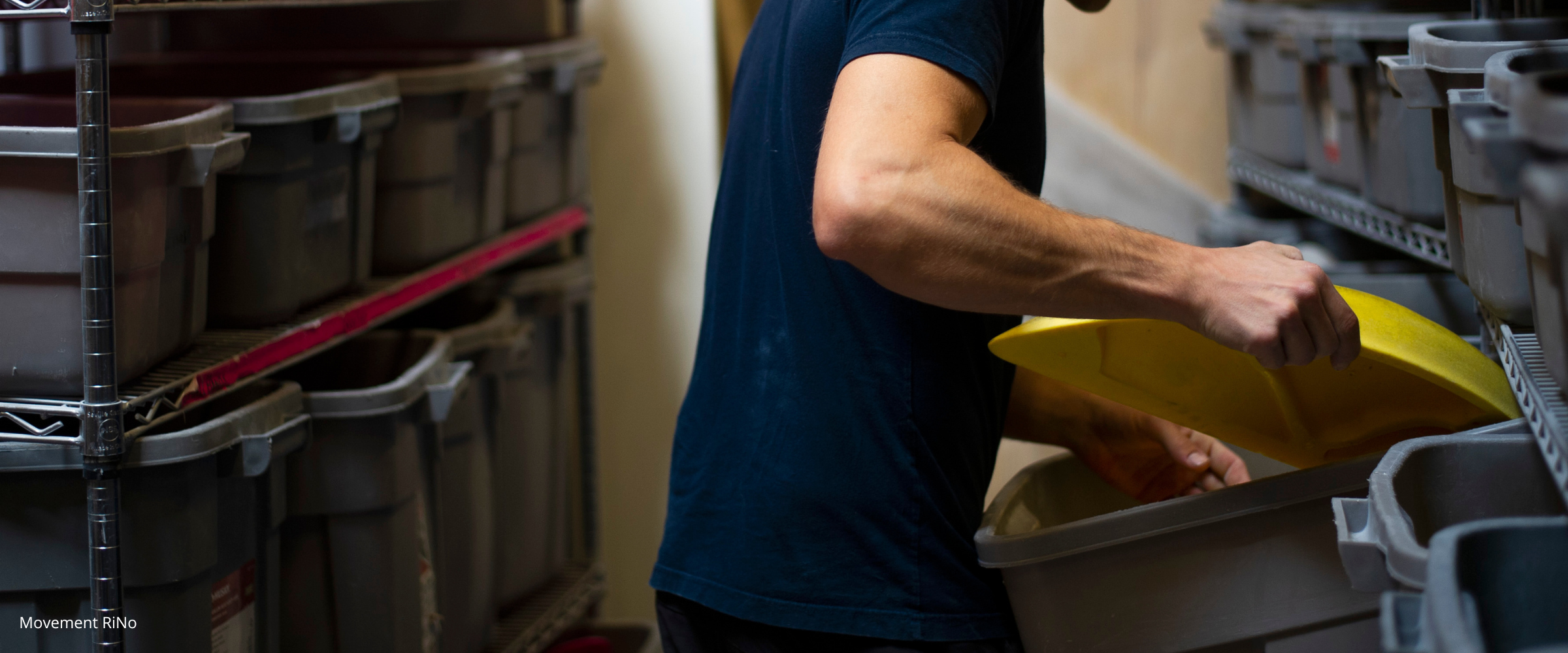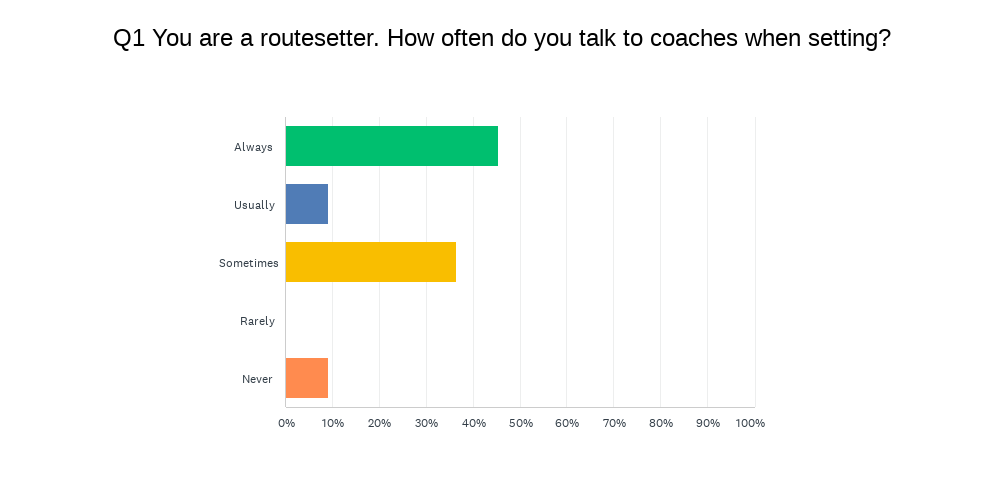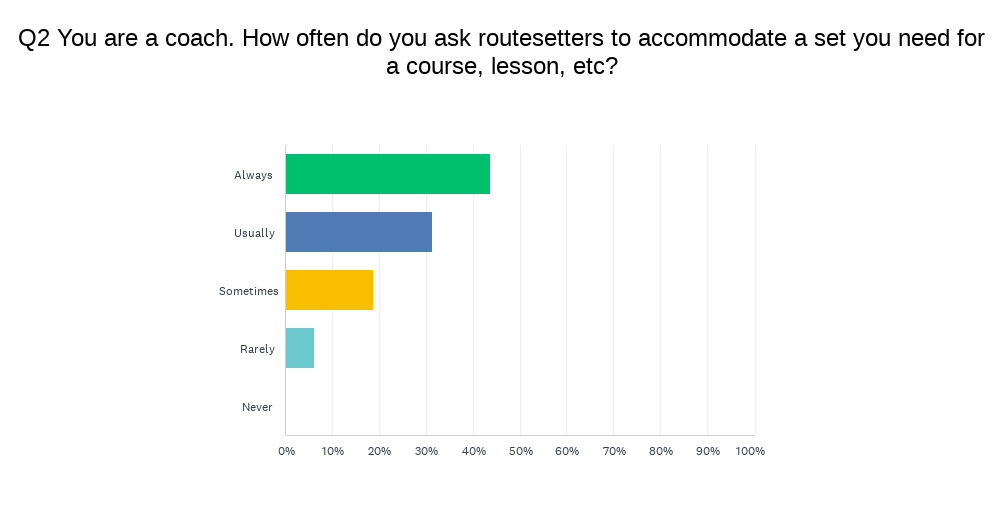Coaches Working with Routesetters: Part 2

As we read in Part 1, so much of what routesetters are responsible for impacts the experiences of competitive athletes training in the commercial gym space.
Article At A Glance |
|
Now I will be looking at how coaches—whose bottom line is long-term athlete development—can help and supplement routesetting teams to improve the overall experience in a gym for athletes and members.
Cross-Pollination Between Routesetting and Coaching
First, it’s important to acknowledge the overlap that exists between coaches and setters. Many setting teams include staff who may “double dip” as coaches, and in some cases, coaches may take on part-time routesetting responsibilities.
This multifaceted role that gym employees often adopt is an asset for the community, allowing for a more nuanced understanding of the athlete’s needs and the complexities of route creation.
Survey Responses from Part 1
Respondents anonymously answered the following questions...


The overlap between the two job functions can foster deeper collaboration between coaches and routesetters. It’s crucial that both parties recognize and embrace this connection, so it does not become a negative where the employee is overworked, jaded, or unable to do both things being asked of them.
Coaches often bring a broader competition-focused perspective that commercial routesetters, especially those who don't actively coach or set for comps, do not always possess. For example, while a typical routesetter may work on a handful of competitions annually, many coaches attend significantly more competitions, offering them insight into the competitive scene than routesetters.
Coaches as a Resource for Trends and Movement Insights
Coaches are often deeply immersed in competition climbing, which equips them with a unique understanding of movement trends.
It’s not uncommon for coaches to work with 15-20 events per year, watching videos, analyzing athlete performance, and staying tapped into international competitions like those of the International Federation of Sport Climbing (IFSC), or even being clued into the world of Comp Kid Instagram (It is super important, though, to remember the SafeSport rules on digital communication for youth coaches).
Because of this, coaches can be vital resources for routesetters, offering insights on trending holds, move styles, or routesetting strategies that could benefit athletes.
Incorporating these insights can be as simple as coaches sharing ideas with routesetting teams throughout the season or assisting in the development of training camps.
This shared knowledge can improve the fluidity and relevance of routes in the gym, creating a more enriching training environment for competitive climbers.
Creating Community: How Coaches Can Actively Support Routesetters
So, how can coaches contribute more directly to a setter’s work and professional development without just spraying about whatever cool move they saw set on Medji’s Instagram?
Professional Development through Collaboration
One of the most effective ways to build this synergy is by having routesetters “guest coach” at practices or having coaches help forerun. While this doesn’t mean that setters should be responsible for full-scale coaching, they can offer a unique perspective by designing skill stations for the team.
A collaborative practice that I have used looks like this:
Pre-Practice Setup:
Routesetters and coaches arrive about 45 minutes before practice begins. Together, they rope off a small section of the wall that will be used for skill-building during the session. Routesetters then add holds or volumes to create specific challenges, such as practicing balance on a slab by "volume walking" or setting dynamic moves on overhangs. (Think an intentional “spray” wall almost like a Dyno Comp).
Skill Exploration:
After the team warms up, athletes rotate through skill stations, receiving input from both coaches and routesetters. This offers athletes a chance to explore new movement strategies, with feedback coming directly from the routesetters who created the problem or challenge.
Post-Session Breakdown:
After an hour or so, routesetters can strip the stations, reset anything that may have been modified, and reopen the area for general use while the athletes move on to something else.
This type of collaborative practice benefits athletes by merging the technical expertise of both parties. Routesetters gain insight into how athletes interact with their problems, while coaches help ensure that the skills being developed align with the athletes’ long-term goals.
Including Routesetters in Mock Competitions and Training Camps
Mock competitions or training camps are a critical component of many competitive teams' training programs, and including routesetters in these events can significantly enhance the experience. Coaches can invite routesetters to observe mock comps, which offers routesetters the chance to see how athletes tackle different problems with innovative or unexpected beta.
A benefit of this is that members may have a few days of super high impact and comp-style moves, but they don’t have to eat up wall space permanently like other solutions I may pose in this series.
Involving Routesetters in Competition Preparation
Another crucial area where coaches can help routesetters is in the lead-up to competitions.
Even if routesetters are not directly setting for a specific competition, coaches can invite them to be part of the preparation process. This might involve routesetters forerunning problems, analyzing movement patterns, or even helping develop a list of necessary movements and skills that should be prioritized in training.
This type of collaboration not only benefits athletes but also allows routesetters to think critically about movement as it applies to high-pressure competitive environments.
They gain a deeper understanding of how competitors will interact with their problems, which, in turn, informs their future routesetting in the gym.
Coaches Supporting Routesetters in Their Professional Growth
In many gyms, routesetting can feel isolated, with routesetters working in the early mornings or late evenings, largely disconnected from the day-to-day activities of the climbing community both logistically and sometimes literally behind a fence or barrier.
By fostering more direct collaboration with coaches, routesetters can benefit from a more holistic view of the athletes’ needs and see firsthand how their work impacts performance.
Coaches can also provide feedback loops for setters by offering observations on how athletes are performing on specific problems.
Is a particular lead route too cruxy/reachy for too many athletes due to a single bottleneck move? Are climbers consistently finding unintended beta to bypass cruxes? These types of insights are invaluable for routesetters looking to improve their craft, and coaches are often in the best position to provide them.
This feedback loop doesn’t need to be formal, but creating regular opportunities for coaches and routesetters to discuss athlete performance can improve both the routesetting and coaching processes.
The relationship between coaches and routesetters is one that thrives on collaboration. By inviting routesetters to participate in practices, including them in mock competitions and training camps, and providing valuable movement insights, coaches can help routesetters better meet the needs of competitive athletes and the broader gym community.
Both parties share the goal of improving athletic performance and the overall climbing experience, and when they work together, they create a more dynamic and supportive environment for everyone involved.
Ultimately, it’s the athletes who benefit most from this synergy. When coaches and routesetters collaborate, the athletes experience more relevant, challenging, and innovative routes that push their development in meaningful ways. As the climbing community continues to grow and evolve, this partnership between coaches and routesetters will remain crucial to the success of athletes and the satisfaction of gym members alike.
Coaches: Register For Our Upcoming Webinar
Don't miss our upcoming Coaching Roundtable, just in time for discussions coming out of certification events at the Setter Summit.
Register for free as a CWA Member below. We hope to see you there!
About the Author
 Carter Smith is a coach, routesetter, and outdoor educator. He is currently the Head Coach for Triangle Rock Club and lives in North Carolina with his partner and 2 dogs. Carter received his Masters in Experiential and Outdoor Education from Western Carolina University in 2022. Carter’s passion lies in helping children and adults to use climbing as a vehicle for self discovery.
Carter Smith is a coach, routesetter, and outdoor educator. He is currently the Head Coach for Triangle Rock Club and lives in North Carolina with his partner and 2 dogs. Carter received his Masters in Experiential and Outdoor Education from Western Carolina University in 2022. Carter’s passion lies in helping children and adults to use climbing as a vehicle for self discovery.
